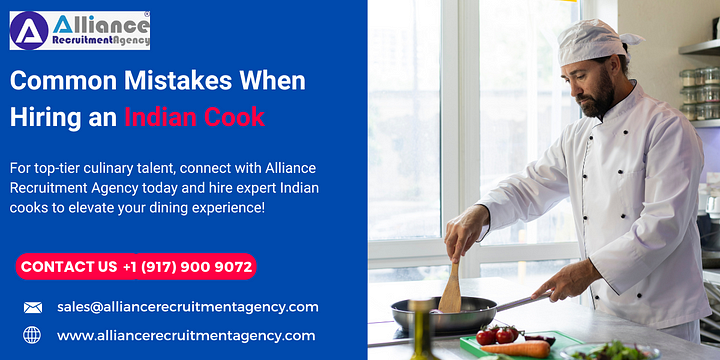Common Mistakes When Hiring an Indian Cook
Employing an Indian cook generally proves to be a fulfilling engagement for those who are fed up with most of the outside Indian restaurants and want to enjoy real authentic Indian food right at home. But of course, there are some challenges in hiring, just like any other hiring scenario. Most people go through very common mistakes while hiring Indian cooks, which might later lead to disappointment or, at times, frustration in life. Knowing those pitfalls ensures you a healthy passage to hire one and maximum returns from that culinary experience.
1. Not Understanding the Cook’s Specialization
Most of the clients do not realize that the Indian cook they have hired has expertise in Indian cooking. Indian cuisine is very vast, and every state has its own unique flavors absorbed from that culture’s practices and ingredients. For example, Northern Indian cooks are more likely to prepare biryani, butter chicken, or naan, while a South Indian cook specializes in preparing dosas, sambars, and coconut-based curries.
One must make sure that the cook hired is acclimatized to the type of Indian food preferred to avoid disappointment. Ask for specific dishes he enjoys cooking well to see if he is aligned with your preferences. Otherwise, you might be disappointed if the cook does not prepare what you want him to do.
2. Not Providing Clear Expectations
Communicating clearly what expectations are is also another mistake that people commit. Let the person know what you want regarding the menu, style of cooking, dietary restrictions, and even the level of spicy food. Indian cuisine can vary from mild to extremely hot, and it can also be complex or very simple. If the customer wants healthy options, vegetarian dishes, or gluten-free meals, such things should have been discussed initially.
In addition, not communicating your expectations clearly can cause misunderstandings and will make meals not fit your requirements. That very clearly shows that good communication is the basis on which the cook will provide the exact food that you expect.
3. Overlooking Hygiene and Safety Standards
Indian cooking can be so elaborate with its procedures and ingredient list that hygienic and safety practices become a necessity. Most people reckon that being a professional cook, hygiene will come in automatically. However, this is not always true. It is always advisable to check whether such a cook meets all the criteria for food safety standards in terms of cleanliness, safe food handling, and food storage.
This should ensure that your Indian cook is very good at hygiene and aware of food allergies or dietary restrictions. Ask what safety practices he/she implements in the kitchen, such as cleaning equipment and storage procedures. Failure to ask about these might lead to foodborne illness or allergic reactions.
4. Assuming All Indian Cooks Can Handle Large Events
One thing is to hire an Indian cook for a small family event, while another thing would be for a fairly large event or party. Not all Indian cooks are proficiently experienced in catering to events of larger size. When you plan to hold a party or a special gathering, an important thing to consider is hiring a cook experienced in organizing big events.
An expert cook in preparing food for a smaller family may not have the logistics or the capacity to deal with a larger gathering. Therefore, specify and clarify whether the cook has experience catering to the same number of guests you are expecting and ask about other events that he has catered to.
5. Ignoring Cultural Sensitivity
It is generally known that Indian cooks are insiders in their profession, bringing along not only skills but a cultural understanding that goes with it. However, certain people disregard the cultural nuances, which determine Indian food. These might be the vegetarian preference, the religious dietary restrictions, or specific rituals one ought to perform while making specific dishes.
When hiring an Indian cook, cultural background and tradition should be duly respected. If you don’t know about the cultural importance of certain ingredients or preparation methods, ask the cook to enlighten you about such things. In this way, one may lead to a peaceful coexistence and cultured appreciation of the food.
6. Choosing Based Solely on Price
Indeed, budget is a very important factor when hiring any cook, but Indian cooks should not be chosen based on only the cost up to a point. Quality ingredients cannot be produced at low prices; expertise does not come cheaply; and experience has its costs. Such cheap hires may not be skilled or might even cut corners because they may not be committed to a high-quality experience. It is important to balance cost with the level of expertise and quality you expect.
Conclusion
It is possible to improve the dining experience by hiring an Indian cook. But hiring needs a lot of care. Keep away from these mistakes—like not knowing what specialization the cook has, not telling him what exactly you expect, no consideration of hygiene, assuming that all cooks can handle big events, ignoring cultural sensitivity, and price only—that will confuse you about finding the right person for the job. Time will make it easy for you to hire a skilled and experienced Indian cook who would fit all your requirements, and then you can enjoy the full richness and authenticity of Indian cuisine. For top-tier culinary talent, connect with Alliance Recruitment Agency today and hire expert Indian cooks to elevate your dining experience! Contact us now.
